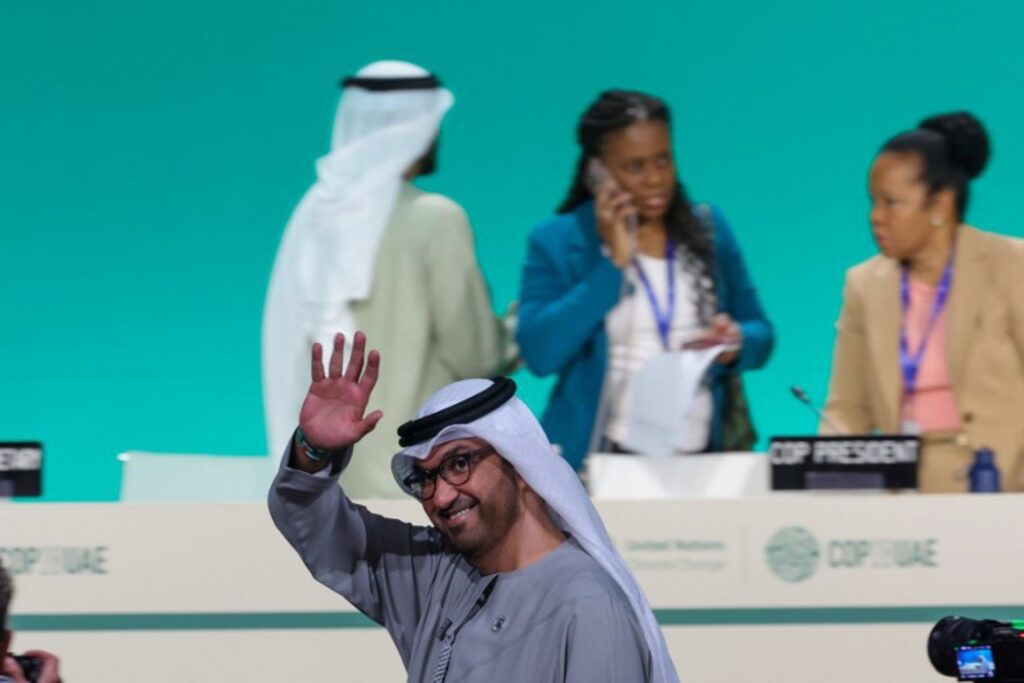A final text calling for "a transition away from fossil fuels" was approved at the UN climate summit in Dubai on Wednesday, the first time such a call has been made at the climate summit.
Nearly 200 countries adopted the first "global assessment" under the Paris Climate Agreement, calling in particular for a transition away from fossil fuels in energy systems, to achieve carbon neutrality by 2050.
Although the text is convoluted, with numerous clauses shaping the agreement, its ambition to move away from fossil fuels – the key driver of global warming – is unprecedented in a decision by a UN climate conference. However, the clear exit ("phase out") from fossil fuels previously demanded by more than 100 countries did not make it to the final text.
The president of the climate summit, Sultan Al Jaber – the top executive of Abu Dhabi's state oil company – applauded the text as he announced the "historic package" before the plenary session.
He hailed the text a robust action plan which keeps the +1.5°C global warming target (as agreed in the 2015 Paris Climate Accord) within reach, although many climate scientists remain highly doubtful that this will actually be achieved.
Loopholes
COP28 seemingly got off to a flying start with a swift decision to set up a fund for the climate losses and damages of the most vulnerable countries.
However, old patterns soon emerged at the annual climate conference, with lengthy discussions, dubious posturing, turbulent negotiations and divisions between ‘Northern’ and ‘Southern’ countries. Central to the discussions at this mid-point is the future of fossil fuels worldwide, raising questions about whether a deal would be reached for the final text.
Seemingly against all odds, the COP28 president's text was made public on Wednesday morning and adopted in a plenary session just a few hours later.
The 21-page document calls on countries to transition away from fossil fuels. However, it does leave loopholes open, such as the continued use of gas and a dependence on carbon capture and storage (CCS) – a nascent technology that is far from being capable of reversing global warming by removing greenhouse gas from the atmosphere.
European Commissioner for Climate Action Wopke Hoekstra stated that “We cannot CCS ourselves out of the problem,” though he welcomed the agreement.
The target to triple renewable energy capacity by 2030 and double the pace of energy efficiency also reached the final text. The G20 countries have already committed to this.
Yet whilst the host nation was eager to conclude the conference in a spirit of celebration, many observers have been more tempered in their response, pointing out flaws in the document and arguing that it "lacks teeth" to really penalise nations that fail to withdraw from fossil fuels. Moreover, island nations and smaller communities have denounced the lack of commitment to help them deal with the ravaging effects of climate change.
Related News
- COP28: Will an agreement be reached on phasing-out of fossil fuels?
- Brussels increases its contribution to Climate Adaptation Fund at COP28
Greens/EFA MEP Jutta Paulus said that her party "will not rely on commitments only," and added that the "task of setting clear and binding dates for the phase-out of oil, coal and gas" still has to be carried out.
Paulus drew attention to other greenhouse gases such as methane, which has a considerably more powerful warming effect than carbon dioxide. "Climate killer methane is responsible for 30% of global heating already. After tackling methane emissions from the energy sector, the EU now needs to change its agriculture policy to reduce this strong greenhouse gas."

